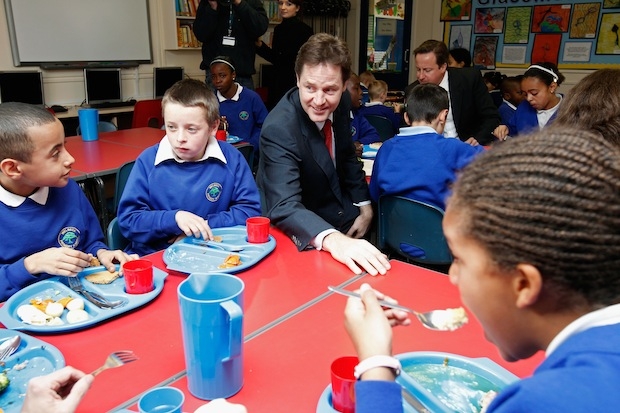There’s plenty of fun to be had with the Lib Dems’ decision to give all infant school children free school meals. Firstly there are the letters from MPs like Simon Hughes slating the policy (the Southwark MP told constituents that his local council was ‘spending £15 million giving free school meals, some of this going to the borough’s richest families, irrespective of whether they can afford to pay for them already’).
And then there’s the fact that the party has attacked universalism on a number of other fronts, most notably the winter fuel payment, which Nick Clegg and colleagues say is a waste of money as it goes to rich pensioners who don’t need it, and child benefit for higher earners. So the Lib Dems are now in the tortured position of believing that winter fuel payment is bad because a wealthy older man can spend it on fine wine as he is perfectly capable of cover his own heating bills, but at the same time giving a £400 annual saving to mothers who are perfectly capable of sending their children to school with smoked salmon sandwiches in their packed lunches.
But it’s not just that. The party appeared this week to be cementing its credentials as a centrist party that believes in markets rather than endless state spending, and believes in tax as a means of collecting revenue, rather than some moral force that politicians can wield against people they don’t like. The votes that Nick Clegg won underlined this, and in the past few years a new faction in the party has emerged that represents the economic liberals (more on this here). This move shows that they do believe in a big state, and one that offers welfare for the many, regardless of need, not just the few who could really do with the money or the free food.
They could conceivably have rolled free school meals out to families who do not meet the free school meals criteria at the moment, but whose low incomes mean they still struggle with the cost of feeding their children, and then spent the rest of the £600 million on breakfast clubs, rather than on families who don’t need the state.
But Clegg’s aides argue that they believe in an ‘enabling’ state, and that universalism of this sort does poll rather well with their voters. And of course aside from the principle of the whole thing, this will poll incredibly well with the mummy and daddy vote: three years of not having to make a packed lunch would cheer up any parent.
But the debate about welfare seemed to be moving in the direction of a needs-based argument, with even Labour saying that pensioner benefits couldn’t be protected in the next Parliament. Tory MP John Redwood appears to enjoy dumfounding audiences at fringe sessions on welfare by announcing that he wants state benefits to be more generous – at the expense of the handouts that people don’t need.
Internationally, the tide is turning too: yesterday King Willem-Alexander told the Dutch parliament that in today’s society, people ‘want to make their own choices, to arrange their own lives, and take care of each other’. He said that ‘the shift to a ‘participation society’ is especially visible in social security and long-term care. The classic welfare state of the second half of the 20th century in these areas in particular brought forth arrangements that are unsustainable in their current form.’ Giving people handouts that they don’t need was beginning to lose cultural currency, so it is odd that the Lib Dems think it’s worth continuing to do it.
Still, this is good politics, not just because it’s the sort of thing that, like motherhood and (free) apple pie, normal voters aren’t going to oppose. And it’s clear that the attempt to take Labour on over the cost of living has rattled Stephen Twigg’s cage: all he could say yesterday was that ‘you can’t trust a word the Lib Dems say’. But as well as showing us that the Lib Dems can at least put up a fight, this announcement also tells us a little about how they view the state.







Comments